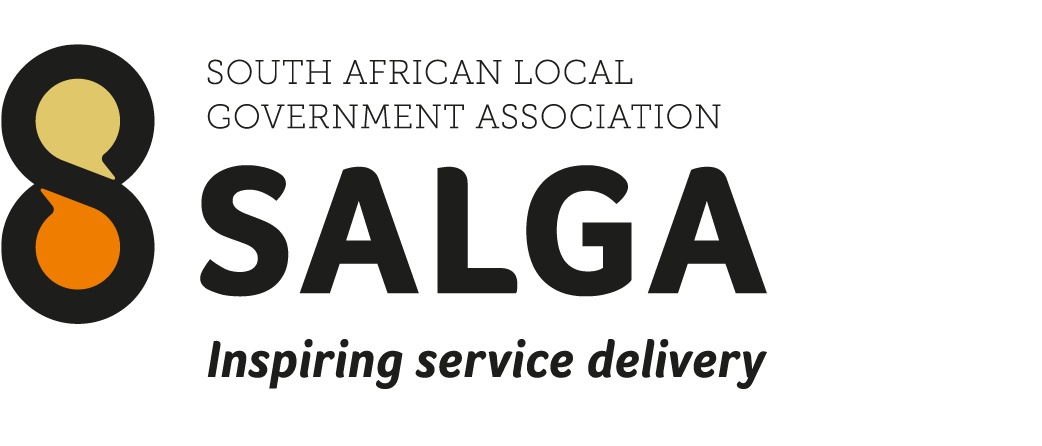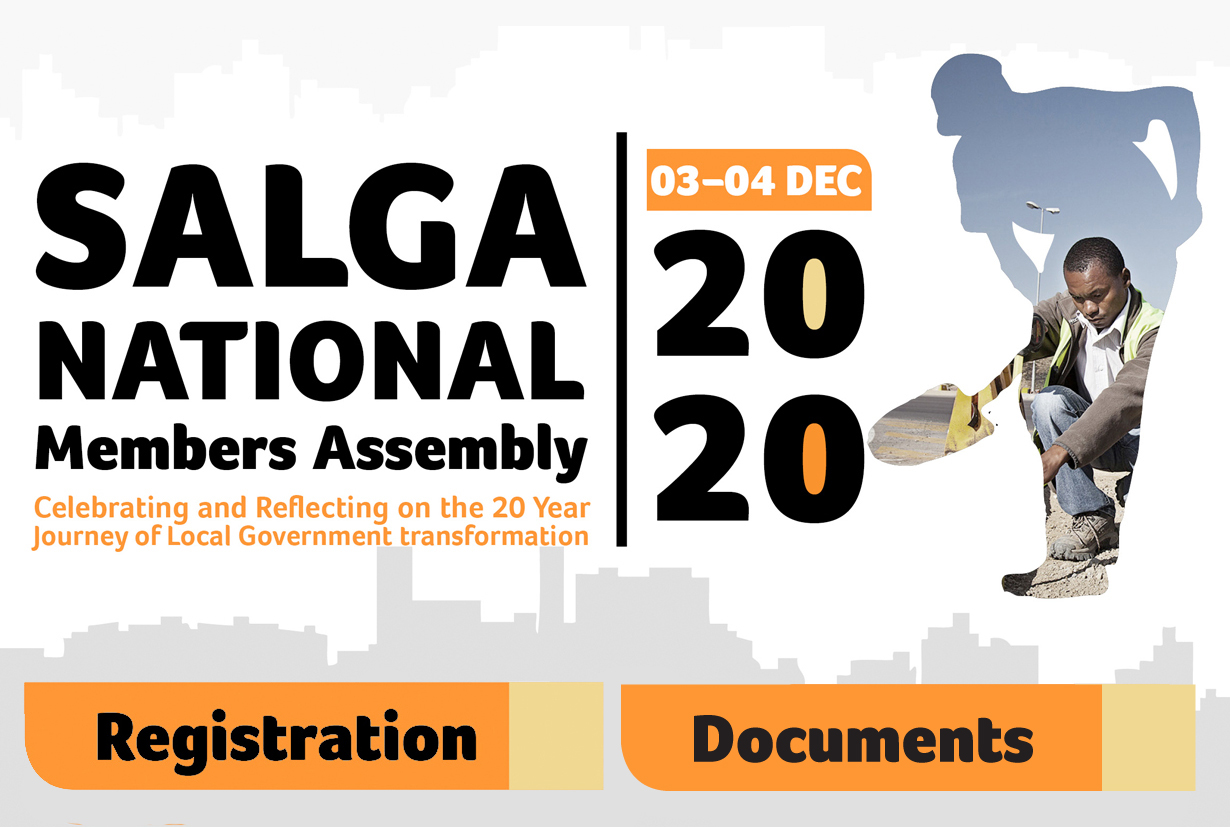
 |
 |
 |
 |
||||
 |
 |
 |
 |
 |
SALGA NEWS |
Upcoming Events |
 |

|
|

|
|

|
|
Annual Report |
 |
Quick Links |
 |
Municipalities |
 |

|
|
Social Media |
 |
Follow Us on Social Media
|
|
South African Local Government Association (SALGA) 3rd annual Local Government Labour Law Seminar
Posted: 25 February 2021
Returning for its 3rd year, the South African Local Government Association (SALGA) Local Government Labour Law Seminar, which took place from February 22-23, 2021, brought together over 300 attendees and participants for thoughtful engagement and discussion on how the COVID-19 pandemic reshaped the relationship between workers, employing entities, trade unions and the government.
Held under the theme “A Responsive and Effective Municipal Labour Relations System in a Rapidly Changing World of Work”, the seminar was a platform for professionals and innovative thinkers in the areas of labour practice, labour relations management and performance management to share game-changing keynotes and discussions.
The hybrid seminar, which combined a live in-person event with a virtual online component, ensured that attendees and participants not only felt safe, but also complied with all the regulations and safety measures related to gatherings during the pandemic.
A session titled, “Macro Perspectives in the World of Work”, saw Gamelihle Sibanda, Chief Technical Advisor for Employment Intensive Investment Programme - International Labour Organization (ILO), Southern Africa, deliver a presentation on the implications of the Fourth Industrial Revolution (4IR) on the future of work.
He spoke on how companies and organizations adopted new technologies to support employees who worked remotely during the COVID-19 pandemic, an environment which brought both great opportunities and serious risks.
“If you think about it, when you are working online, the employer does not exactly know what you are up to. So employers are saying ‘hang on’, maybe we should be paying you not for working from 8-4 but we’ll pay you for what you have actually produced,” Sibanda said.
Sibanda explained at great length on how new technologies promised to create new jobs while at the same time threatened to replace existing ones and added that the COVID-19 pandemic had an implication on worker’ rights“
If you are moving the factory (workplace) to the kitchen (employee homes), what will this do for worker rights? What about non-unionised workers who had the support of unions, now you’re working from your bedroom, who is going to protect you, how are dispute resolutions going to happen?”.
In a session on COVID-19 and its impact on the public sector collective bargaining arrangements and applicable jurisprudence, Modise Letsatsi, Director: Centralised Collective Bargaining at the Department of Public Service and Administration (DPSA), shared his reflections on the public sector wage dispute where unions want the government to honour a 2018 wage agreement for CPI, plus a 1% wage increase.
Letsatsi indicated how fiscal pressures made the agreement unaffordable as plans were underway for the government to reduce the expenditure on public service wages.
As government remains locked in a Constitutional Court battle with labour unions over the matter, Letsatsi lamented the impasse and called for the creation of a social compact, where government and unions could cooperate for the greater good, to restructure the economy and achieve inclusive growth:
A social compact in the context of collective bargaining requires:
- Mutual respect and transparency
- Communication to overcome inevitable resistance.
- A new public sector-wide collective bargaining coordination mechanism to bring about cohesion in terms of bargaining parameters and processes across the state.
- A commitment to take the high road of employer labour collaboration to achieve efficiency gains and to avoid the lowroad of downsizing and cost cutting.
Adv. Jazz Vilakazi unpacked lessons learnt from a handful of cases in South African labour law and their impact on the local government sector.
Some of the cases detailed how many employers took steps to reduce their employees’ remuneration in light of the financial impact of COVID-19 on business operations.
In one instance, Adv. Vilakazi indicated that employers were not allowed to make unilateral changes to the terms and conditions of an employee’s employment, even in the event of cost-cutting strategies.
He added that employers had to properly engage with their employees or their trade unions to communicate cost-cutting strategies.
William Thomson, a practicing attorney and labour relations mediator spoke about the acrimonious relationship between labour and management and what steps were needed to bring about harmonious working relations.
“Labour relations have deteriorated; adversarial style of negotiation and The CCMA needs to be more proactively involved in dispute prevention and workplace transformation,” he said.
He spoke about the importance of Section 1 (d) of the LRA which aims to promote:
- Orderly collective bargaining;
- Collective bargaining at sectoral level;
- Employee participation in decision-making in the workplace; and
- The effective resolution of labour disputes
Zwe Ndlala: Senior Manager, Collective Bargaining and Labour Relations at SALGA, delivered a presentation titled, “Local Government Experiences in COVID-19 Mitigation Efforts: A SALGA Perspective”.
In it, he spoke about the importance for the government to implement a risk allowance for all essential service workers in the public sector during the battle against the coronavirus and outlined the steps SALGA will take to ensure that it’s realised.
“SALGA shall after lockdown consult municipalities for a mandate on the negotiation of the compensatory framework for employees that remained on duty during the various alert levels of lockdown. The compensatory framework might be presented in monetary or non-monetary terms,” Ndala explained.
Lusanda Raphulu: Head of Employment & Benefits Practice Group at Bowmans, spoke about workplace health and safety obligations of employers during the Covid-19 pandemic.
She said that in light of the pandemic, employers have to take the necessary precautions that would minimise the risks and hazards related to the infectious disease.
“The promulgation of the covid-19 regulations has had an impact on a number of areas within the employment context from an Occupational Health and Safety perspective. Various workplace measures employers had to implement - displaying notices; requiring wearing of face masks; providing hand soap and clean water for hand washing, and alcohol-based hand sanitizer (at least 70% alcohol); ensuring surfaces are routinely cleaned and disinfected,” said Raphulu.
Raphulu ended with the thorny subject on whether employers can impose a vaccination mandate for their employees.
“There are circumstances in which such a mandatory vaccination policy will be permissible, namely, if not having the vaccine may create a serious risk to public health,” she said.
Melissa Cogger, a senior associate at Bowmans Attorneys, spoke about the laws and ethics of remote employee monitoring amid the COVID-19 pandemic.
In other words, since the lockdown began and employees started working from home, companies have been installing workplace privacy and employee monitoring technologies to ensure that employee productivity remained optimal.
“An employee cannot reasonably expect privacy in relation to company issued devices and access to employer provided networks, emails, and online platforms,” said Cogger
Cogger, however, said that: “Employers must familiarise themselves with the provisions of RICA and obtain either prior written consent by the employee or be certain that the interception is necessary for the carrying on of the employer’s business. The former is the least risk averse option.”
The last session for the day focused on Gender-Based Violence (GBV) during COVID-19, with a specific reference to the workplace.
Kubi Rama, Executive Director at Gender Links, spoke about how women are disproportionately impacted by gender-based violence including sexual harassment and assault in the workplace.
Mbuyiselo Botha, a commissioner at the Commission for Gender Equality and gender activist Naledi Masipa made their inputs on how local government, as the sphere of government closest to the community, can tackle GBV.
Botha called for SALGA to ensure that municipal councils put GBV on their agenda and the tackling of GBV should become a key service delivery issue for local government.
It was also explained that the unintended consequence of coronavirus lockdowns, which confined individuals to their homes and only allowed them to go outdoors for essential services, sparked an increase in GBV cases.
Day 2
The second day of the SALGA 3rd annual Local Government Labour Law Seminar heard Rio Nolutshungu, Chief Officer, Municipal Capabilities and Governance at SALGA, speak about the establishment of the Local Labour Forum (LLF) Training programme for employer representatives.
The programme has been piloted and a national roll-out has commenced. Currently a two-day course is aimed at the Employer component of the LLF.
Nolutshungu explained that overall aim of the training programme would help in closing the trust gap between management and organized labour.
“The LLF exists to ensure workplace harmony for the greater fulfillment of the constitutional mandate of the municipality,” he said
The objectives of the training programme include the following:
- To create informed members about the LLF mandate,scope and operations.
- To provide practical tools and processes for meeting planning and management.
- To provide skills training in Interest-based bargaining,conflict resolution and communication.
- To promote an agreed upon terms of reference as well code of conducts for LLFs.
- To provide a platform for interactive discussions and shared experiences as well as present applicable case studies.
- To equip LLFs to make meaningful input in skills development planning, employment equity plans, wording conditions and municipal planning and to conclude minimum service agreements.
Dr Anneline Gildenhuys, a Director at Aequitas Consultants spoke about what employers are obligated to do when an employee becomes a victim of sexual harassment or racial discrimination in the workplace.
She explained that under the Employment Equity Act, employers were obligated to promote equal opportunity in the workplace by eradicating unfair discrimination and eliminating it from their employment policies and practices, and if employers failed to do so, they could be held liable liable for the conduct of perpetrator employees under Section 60 of Act.
Dr Gildenhuys explained that all employers should have in place strict policies on sexual harassment and racism in the workplace in line with the Employment Equity Act and added that employers should adhere to their own policies lest they be held responsible for not taking any action.
Krish Chetty, a Chief Researcher at the Human Sciences Research Council (HSRC), explored issues relating to remote based work in the context of the COVID-19 pandemic, including productivity, promoting collegiality as well the financial implications of this transition amid the pandemic.
Adv. Anton Boswel from Anton Boswell and Associates explained that the pandemic saw employers transition away from the traditional office setting to remote work as a public health response to slowing the spread of the disease.
“The Covid-19 pandemic has forced employers to restructure the traditional workplace environment due to the necessity of keeping social distancing protocols in place,” he explained.
Adv. Boswel explained that remote working also had an impact on how employers managed their employees.
“Remote working presents a unique set of problems to employers regarding the management of their employees. Some of these problems are: Time keeping; Overtime hours and compensation meal and rest breaks; work from home infrastructure and expense reimbursement,” he said.
In that instance Adv. Boswel explained that it was important for employers to establish the following:
- Rules of conduct setting out when where and how the employee must be available and responsive;
- When lunch times and tea times will be taken;
- How performance will be reported and managed considering the employee’s circumstances;
- What practical steps can be taken to motivate employees to organise themselves to work remotely and in this case from home.
- Implement measures to ensure that working hours and rest breaks occur in line with the employer's terms and conditions of employment.
- Ensure employees record the total hours worked each day or week.
- Utilise online attendance or email methods to record working hours.
Cllr Xola Pakati, a SALGA National Executive Committee Member (NEC and Chairperson of the National Capacity Building & Institutional Resilience Working Group at SALGA, closed the two-day seminar by thanking the attendees and participants for bringing their expertise and experience around the table in an engaging and constructive way.
He explained that the open exchanges throughout the two days of the seminar would play an important role in shaping policy options for the local government sector so that it achieves better outcomes.

